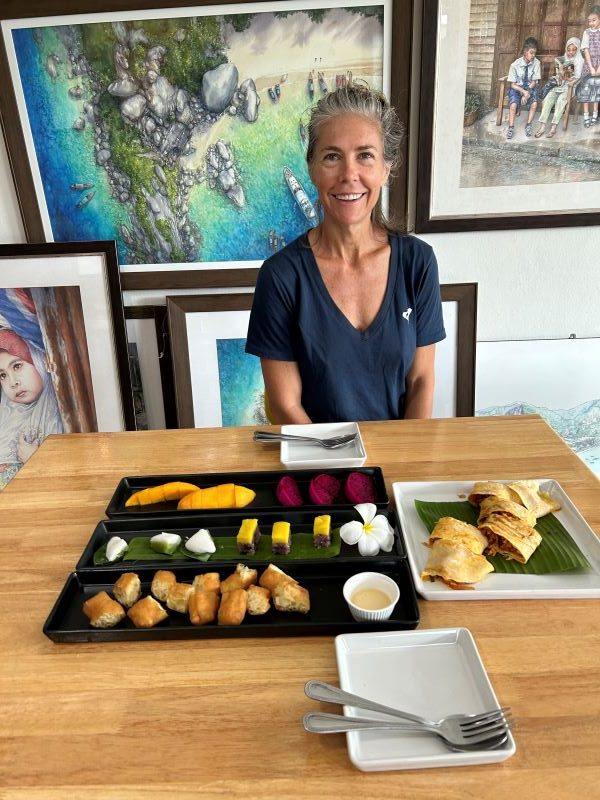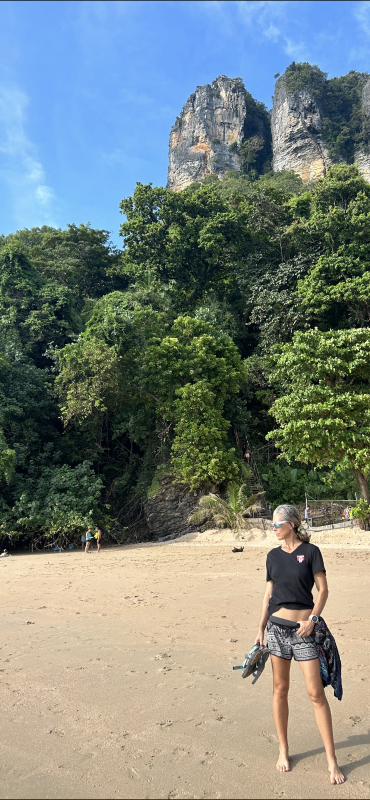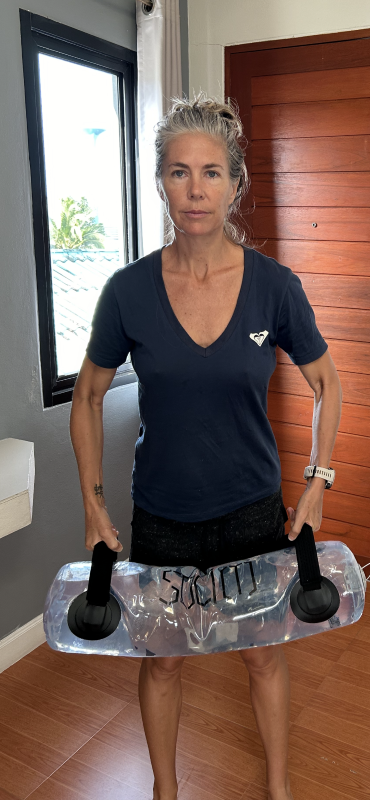 As we age, we may have more opportunities in life to enjoy travel….and most of us deserve that and have earned it throughout our years. We also may have to travel more often for business as we reach senior management levels. Keeping in mind from our earlier conversation in our ‘INFLAMMATION “ blog post, that as we age, a multitude of factors causes inflammation and ultimately disease. These factors have an accumulative effect over time and we cannot let up on the gas with our inflammatory strategies – even while traveling. The importance of rest, diet, nutrition, and exercise cannot be understated for overall health.
As we age, we may have more opportunities in life to enjoy travel….and most of us deserve that and have earned it throughout our years. We also may have to travel more often for business as we reach senior management levels. Keeping in mind from our earlier conversation in our ‘INFLAMMATION “ blog post, that as we age, a multitude of factors causes inflammation and ultimately disease. These factors have an accumulative effect over time and we cannot let up on the gas with our inflammatory strategies – even while traveling. The importance of rest, diet, nutrition, and exercise cannot be understated for overall health.
When we travel,either for business or pleasure, we often tend to throw these health and fitness goals out the window. While it may be beneficial to take a break from “life” challenges while traveling, it is easy to still indulge in all those fun things- but still be healthy! Your health and fitness practices do not need to take a back seat while traveling. Below we will discuss some strategies for taking health and fitness with you on “the road”!
Healthy Eating
Eating on the road means someone else is controlling the ingredients in your food. As a discerning customer, you can most definitely control what goes into your food and ultimately what you put into your body. For example, we know that most restaurant foods and commercially made food products contain highly processed “seed oils” such as canola, corn, or soybean oils. As well, they contain high sugars, salt, dyes, artificial flavorings, and other chemical flavor enhancers and preservatives. All of these products are highly inflammatory. It is important to look at all ingredients in any commercially made product and choose them wisely based on their ingredients.
Eating in restaurants does allow you to have certain control of what you put in your body. You have an opportunity to pick which meals have limited amounts of these unhealthy ingredients. You can still pick delicious restaurant meals – but you may have to ask questions about what is in them. Some restaurants now are good at offering organic, gluten-free, sugar-free, and fat-free meals you just need to ask and see if they are willing to customize yours!
Tips For Snacking
When on a road trip or traveling, who can resist snacking right? Snacking healthy is easy to do and here are some tips:
- Chocolate – chocolate is one of those go-to foods on the “road” and we get it! It’s pretty yummy stuff but most commercial chocolate bars are just full of “junk”. If you need a chocolate fix then look for bars with natural ingredients. Only buy chocolate that has a handful of natural ingredients. For example, bars that say organic, reduced sugars, or those sweetened with stevia and made without “seed” oils.
- Potato chips – potato chips are also a go-to snack on the “road” however these products contain an enormous amount of oils and they are carbohydrate-rich. They are processed quickly in the body which elevates blood sugars. If you must have chips on the road, then look for simple ingredients such as “just salt” and avoid all chips fried in “seed” oils such as canola oil, sunflower, safflower, corn, and soybean oils. Pick avocado oil fried or baked chips instead as these oils can be cooked at higher temperatures so they don’t oxidize which causes
- Fruits and vegetables are always a must on any road trip and are the most sensible. They are plentiful and easy to prepare beforehand or purchase at your destination. They are healthy, tasty, filling, and anti-inflammatory!
- Absolutely no pop or fruit juices as they are loaded with sugar and the diet ones are laden with inflammatory chemicals. Search for sodas or vitamin waters with stevia and beverages without sugar. Sugar once again is NOT your friend and is highly inflammatory and spike sugars and insulin. Pop is arguably the most unhealthy product in our world. It is an extremely popular product that has culturally been promoted in our society (similar to cigarette propaganda in the 1970s). It has outrageous amounts of sugar and for that reason, it can be considered a toxin.
- Coffees, expresso, teas, and other yummy coffee shop drinks are healthy….if not loaded with sugars and other flavor enhancers. Many of these products have antioxidants that help with inflammation so choose wisely. Go for the stevia if you need to sweeten these drinks and you can always bring some from home in case you can’t find any on the road.
- Always look at the labels of any product that you consume and look for the following: 1. Sugar content and get to know what is reasonable and what is unreasonable sugar content 2. Fat content and what is reasonable and what type of fat such as saturated or polyunsaturated fats and what type of oils they use such as seed oils, avocado, coconut, animal fat, or olive oil.
- There is a lot of research on fats now which is very confusing. There is evidence that saturated fats are not as bad as once thought but only if consumed with very low carbohydrate intake. Polyunsaturated fats from “seed oils” can be very inflammatory and they are used in almost every product to preserve shelf life as they are cheap and easily available. The debate about polyunsaturated fats or “seed oils” is that they are comprised of some omega-3 fatty acids but mostly omega-6 fatty acids. Both are essential in our diet but what tends to happen in our North American diet is that because we consume a lot of these fats through restaurant fried foods and commercially made foods etc, the omega 6 fatty acids are disproportionate to the omega 3 fatty acids. This imbalance leads to inflammation. It’s important to read what type of fat is in the product you want to consume and choose wisely. While it’s ok to consume polyunsaturated fats, it is important to do so sparingly and not to cause this imbalance. We like avocado oil or olive oil as a better alternative. Look for these oils in commercially made foods as they tend to be healthier for long-term fat consumption. Organic or cold-pressed oils may be a better alternative if reading ingredients on packaged foods as they are not as highly refined with chemicals. Avocado oils and olive oils are monounsaturated and there is growing evidence that they may be better for you as they are less inflammatory. Coconut oil is a saturated fat. Saturated fats combined with sugars/starch/carbohydrates may cause glycation of the blood and lead to sticky blood. This leads to arteriosclerosis and plaque formation in the arteries of the heart. Choose wisely friends, especially at this age. However, in this ever-changing landscape of healthy eating, there continues to be growing evidence that saturated fats are possibly our friends if consumed properly – hence the growing health trend with the carnivore diet. Stay tuned for more in a future blog regarding this provocative diet!

Alcohol
Alcohol is a known toxin and is highly inflammatory. Alcohol is laden with calories, sugars, and carbohydrates, which as we have learned – is highly inflammatory. If that isn’t enough, the alcohol is broken down by the liver into a highly inflammatory product called acetaldehyde. However, much like sugar and fat, it is very tempting to indulge from time to time. If you must do this – then choose your poison wisely. Alcohol that is triple distilled or higher is usually gluten-free as well has generally fewer calories. Wine, although high in sugar, may have some benefits from the chemicals in the grape skins called flavonoids and resveratrol which are anti-oxidative and assist in the anti-inflammatory process. Wine is most definitely a double-edged sword but if you must indulge it may be a better alternative than others. Low-calorie beers may also be an alternative but sugar drinks mixed with sodas and commercial mixers are just plain dangerous. They spike insulin very quickly as blood sugars rise leading to inflammation.

Exercise
Exercising while traveling can be easy as there are so many options. Walking is probably the easiest. You can walk instead of driving or taking a taxi when doing touristy activities. Take the stairs at hotels. Exploring places on foot is fun and easy! Many hotels have gyms and pools, tennis courts, and rental bikes. Just do something! For those who like to do strength training exercises, there are products that you fill with water and use as weights. They are portable and easy to carry and use…simply fill them with water and good to go! You can use this product instead of dumbbells, plate weights, and kettlebells. Go to our October blog on resistance weight training and see the exercises demonstrated by Dr.Freeze. You can do these same exercises with water-filled weights.

Rest, Sleep, Rest
When traveling, sometimes, it’s about go go go! Trying to cram as much into our valuable vacation time can be a problem no different than going to that buffet when we are hungry… we tend to overdo things. At this stage of our lives, it’s time to slow it down and enjoy the forest through the trees. Slow down. Enjoy the moment. Relax. Rest. Sleep. Your body will thank you and repair as you indulge in this very anti-inflammatory process!
Comprehensive Q&A Section
Q1: My vacation time is valuable. How do I work out quickly?
A1: All it takes is 15 minutes a day. Walk, hike, move, and use your water weights first thing in the morning in your hotel room. It is really that easy!
Q2: Why is sugar so bad for us?
A2: Sugar, especially processed sugar, is hidden in almost all processed foods and is full of calories The excess calories raise blood sugar rapidly which can cause inflammatory diseases such as diabetes, and heart disease, and may contribute to cancers.
Q3: Why is fat so bad for us?
A3: Fat is full of excess calories and is hidden in most processed foods. Therefore they tend to be over-consumed. Fat is a complicated but necessary component of our diet and needs to be consumed wisely. Saturated fat from animal products is important for our cellular repair and growth but has its issues if consumed in excess amounts and with excess carbohydrates. Fats from “seed” oils such as canola, sunflower, corn, rice, and soybean are highly processed and in excess amounts can cause an imbalance of omega-6 fatty acids which is inflammatory. Choose olive oils, avocado oils, and possibly coconut oils (the jury is still out on this oil*) instead of seed oils. Coconut oil, although saturated may have some properties that are a healthier choice than “seed” oils, especially the organic kind. Choose saturated fats sparingly if you consume a lot of carbohydrates as this can lead to the stiffening of arteries and plaque buildup.
Q4: I love my Margaritas on my road trip – is this ok?
A4: There are better alcohol options than Margaritas such as wine and triple distilled spirits with soda water and lime. However, if you must have a Margarita, keep in mind it has dangerous amounts of sugar from the “mix”. Instead, ask for blended strawberries or natural lime juice added to your spirits, and if you must – add a pack of stevia for sweetness.
Q5: Why can’t I just live it up while on vacation?
A5: You can most definitely live it up while on vacation! It just doesn’t need to be at the expense of your health and fitness. The years of “life” stressors on our bodies may not have served us well. Now, we must make better choices in order to reduce inflammation and slow the progression of the disease so that we can extend our enjoyment of all that life has to offer – even on vacation or when traveling!
Q6: Why are sleep and rest so important when I travel?
A6: Sleep and rest are such an important component of health and it cannot be understated! Proper sleep releases biochemicals that reduce inflammation and aid in healing the body. To assist in sleeping, we recommend that you engage in “grounding” Grounding is the practice of participating in the energy transfer from the earth into our bodies. To do this, you need to be barefoot and walk on grass or sand for this grounding to occur. It is theorized that grounding connects our bodies to the earth’s electrical charges which causes physiological and psychological advantages through the biochemical release in the brain – thus reducing inflammation and healing the body. Spend more time outside hiking or walking in forests and trees. Let sunshine on your body and participate in all of nature’s glory…you will relax and ultimately sleep better!
Q7: What can I do to support my body and reduce inflammation while traveling?
A7: At FreezeWellness, we offer several anti-inflammatory injectable peptides such as Glutathione, NAD, and Tri-immune boost. All of these products can be taken on the road with you and injected as needed if you tend to overdo it while on vacation.
